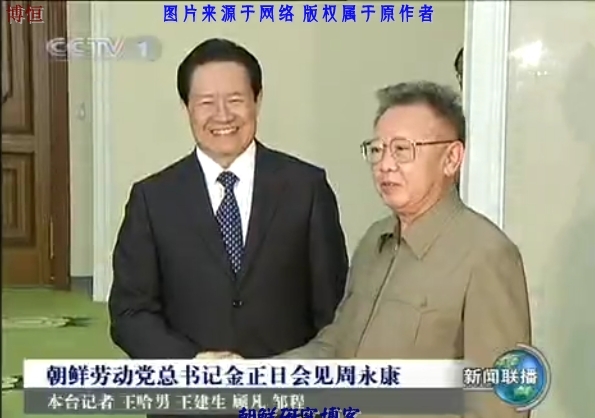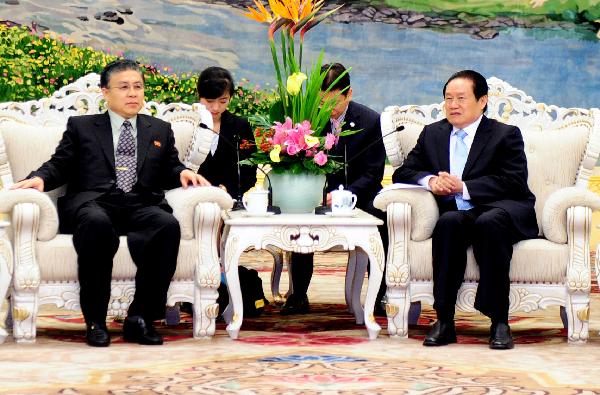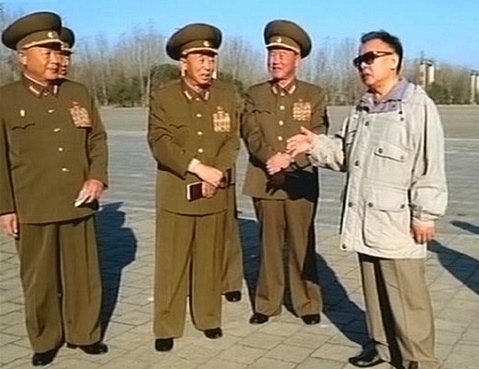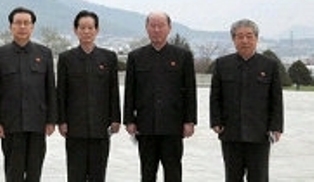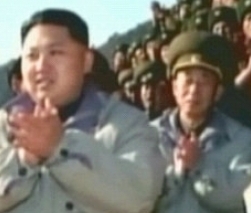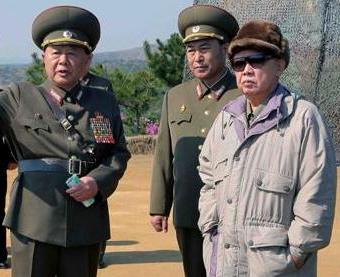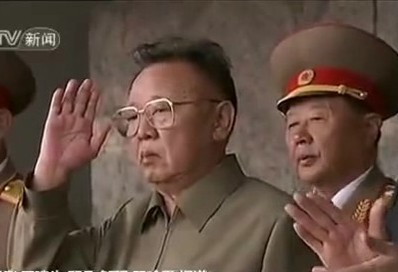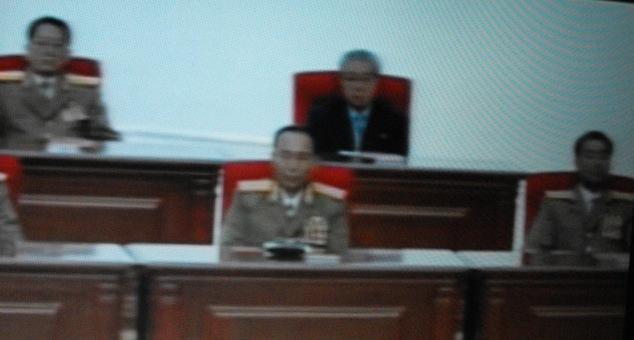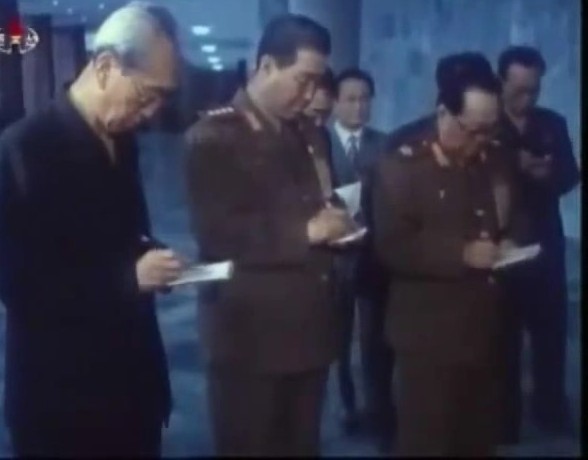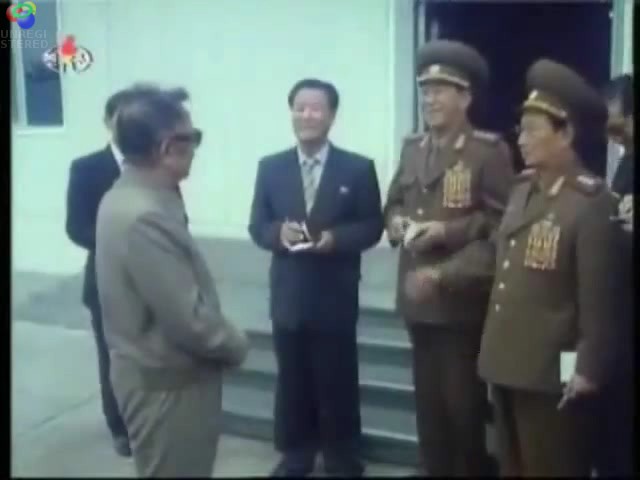
Kim Jong Un (2nd R) and his wife Ri Sol Ju (R) visit a teppanyaki griddle in the restaurant of the Haedanghwa Health Complex in east Pyongyang (Photo: Rodong Sinmun)
DPRK state media reported on 27 April (Saturday) that Kim Jong Un (Kim Cho’ng-u’n) visited the recently constructed Haedanghwa Health Complex in Pyongyang. KJU’s last reported public appearance was his attendance at a banquet commemorating the 81st anniversary of the foundation of the Korean People’s Army [KPA]. He was joined by his wife, Ri Sol Ju (Ri So’l-chu). Madame Ri’s last reported public appearance was in late February, when she watched a basketball game and attended a banquet with Dennis Rodman.
Also attending the visit were DPRK Cabinet Premier Pak Pong Ju, VMar Choe Ryong Hae (Director of the KPA General Political Department), Jang Song Taek (Vice Chairman of the DPRK National Defense Commission [NDC]), Gen. Hyon Yong Chol (Chief of the KPA General Staff), Gen. Kim Kyong Sik (Minister of the People’s Armed Forces), Kim Kyong Hui (KWP Secretary and KJU’s aunt), Kim Ki Nam (KWP Secretary and Director of the Propaganda and Agitation Department), Choe Tae Bok (KWP Secretary and SPA Chairman), Kang Sok Ju (DPRK Cabinet Vice Premier), Kim Yong Il (KWP Secretary and Director of the International Affairs Department), Kim Yang Gon (KWP Secretary and Director of the United Front Department), Kim P’yo’ng-hae (KWP Secretary and Director of Cadres’ Affairs), Kwak Pom Gi (KWP Secretary and Director of the Planning and Finance Department), Mun Kyong Dok (Chief Secretary of the Pyongyang City [municipal] KWP Committee), Col. Gen. O Il Jong (Director of the KWP Military Affairs Department), Han Kwang Sang (Deputy Director of the KWP Finance and Accounting Department) Paek Kye Ryong (Director of the KWP Light Industry Department), Kim Kyong Ok (Senior Deputy [first vice] Director of the KWP Organization Guidance Department), Gen. Kim Yong Chol (Chief of the Reconnaissance General Bureau and Vice Chief of the KPA General Staff) and Jon Il Chun (Deputy Director of the KWP Finance and Accounting Department), among others.
Kim Jong Un began his visit at Haedanghwa Health Complex’s basement garage. According to KCNA, KJU “was pleased to see the completed complex, adding that he appreciated its design and construction after examining the information on it presented to him by the relevant field.” He also visited the store and dining rooms on the complex’s first two levels. He “highly praised the builders for constructing not only the shop but the dining rooms to suit their nature and meet the requirements of formative art,” according to KCNA. KJU visited the restaurant where he remarked that “cooking is a science and art, [he urged] the cookers to steadily improve their skills and display creative ingenuity to serve customers with varieties of tasty and highly nutritive dishes” and had a commemorative photograph taken with the chefs. KJU then went to the second and third levels of the Haedanghwa Health Complex where he visited the public baths, saunas a barber shop, hair salon skin treatment center, workout room, billiard room and other recreational facilities. KCNA reported that Kim Jong Un “personally checked the temperature of water at the bath and learnt about service provided at a face treatment room” and “was pleased to see the wading pool. He was also pleased to go round various saunas built with peculiar building materials such as halite, agate and yellow earth.” KJU also “learnt in detail about what kinds of sports apparatuses are there in the fitness hall and table-tennis hall” and whilst “watching the clock in the shape of billiard balls and billiard table on a wall of the billiard room, he praised the builders for having constructed the room in such a perfect manner that everything there is impeccable.”
KJU then visited the health complex’s e-library and, according to KCNA, said “a relevant field should systematically send various data and videos on cooking to the e-reading room” and he “stressed the need to supply a sufficient quantity of foodstuff necessary for cooking practice so that apprentices may acquire workable knowledge, saying that theory is not enough to acquire cooking skill.” He also visited a coffee shop on the complex’s fifth floor. According to KCNA Kim Jong Un said that “it is the firm resolution of the WPK to enable the Korean people, the best in the world, to fully enjoy wealth and glory under socialism, without tightening their belts again, he noted, underlining the need to build more modern service centers such as the Haedanghwa Health Complex impeccable in any aspect.”
Filed under: 2013 Strategic Rhetoric, Administration Department, Cadre Affairs, capital construction, Central Committee, Central Military Committee, central party life, Choe Ryong Hae, Choe Tae Bok, Col. Gen. O Il Jong, critical infrastructure, DPRK Cabinet, DPRK Premier, Events Management Section, Finance and Accounting, Financial Planning Department, Gen. Kim Kyok Sik, gsd, Guard Command, Hyon Yong Chol, International Department, Jang Song-thaek, Jon Il Chun, Kang Sok Ju, Kim Chong-un inspections, Kim Family, Kim Jong Un Visits, Kim Jong-un, Kim Ki Nam, Kim Kyong Ok (OGD), Kim Phyong Hae (Cadres/NPYPPC), Kim Yang Gon, Kim Yong Il (IAD), KJI Personal Secretariat, Korean People's Army (KPA), Korean Workers' Party (KWP), KPA construction battalions, KPA construction brigades, KPA General Political Bureau, KPA General Political Department, KPA Large Combined Units, KPA supernumerary organizations, kpif, Kwak Pom Gi, Light Industry Department, Mangyo'ngdae Revolutionary School Alumni, military security command [msc], Ministry of Capital Construction, ministry of people's security, Ministry of Physical Culture and Sports, Ministry of Public Health, Ministry of the People's Armed Forces (MPAF), MPAF GPB, Mun Kyong Dok, National Defense Commission (NDC), NDC Administration Department, Organization and Guidance Department, Paek Kye Ryong, Party elders, party life, Political Bureau, Propaganda and Agitation Department, Provincial Party Committees, Provinicial People's Committee, Pyongyang Defense Command, Reconnaissance Bureau, Ri Ryong Ha (OGD), Ri Sol Ju (Kim Jong Un's wife), Ri Yong Su (Workers Orgs/AD), Secretariat, State Physical Culture and Sports Commission, State Planning Commission (SPC), State Security Department, Third Floor, transportation, United Front Department, Working Organizations



































![DPRK leadership attend a ceremony at Tangun's tomb. Seen in attendance are: Yun Jong Ho [a], Choe Jin Su [b], Kim Yong Dae [c], Kim Wan Su [d] and Pak Myong Chol [e] (Photo: Korean Central TV).](http://nkleadershipwatch.files.wordpress.com/2016/10/kfdttskcpy-ktvoct42016a.jpg?w=547&h=349)











